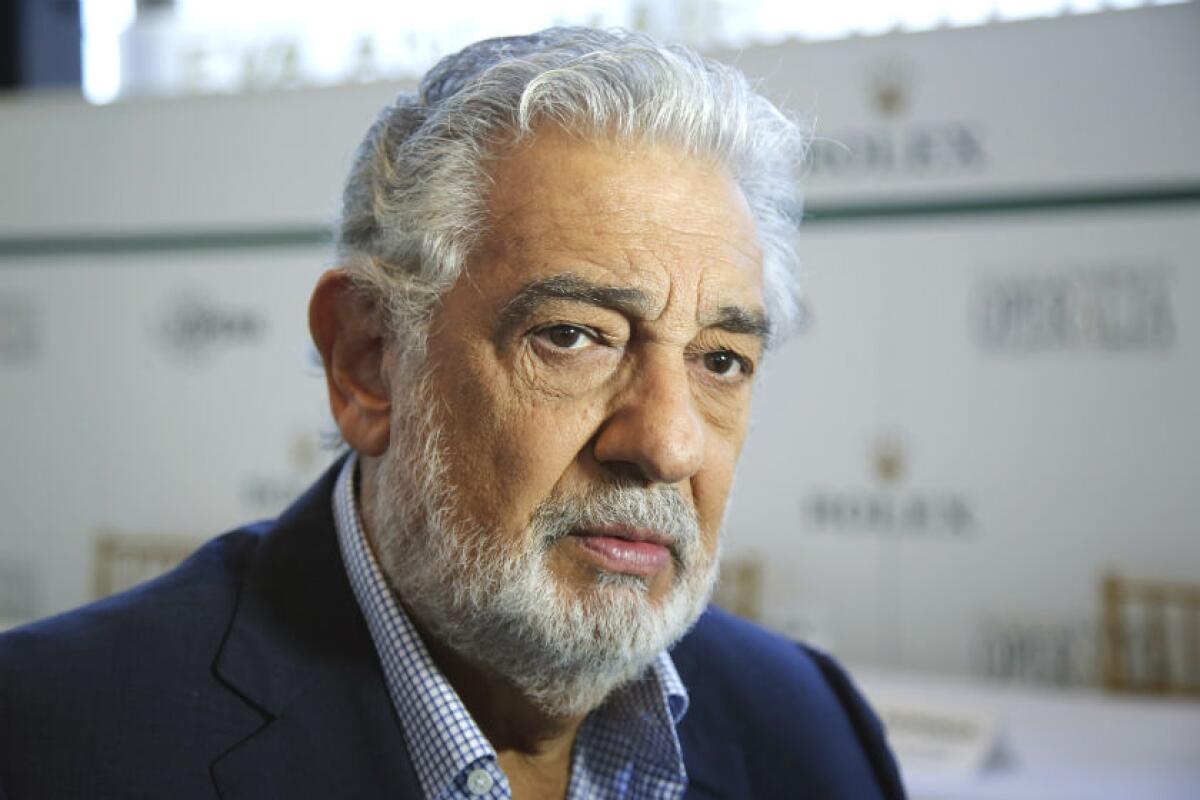Plácido Domingo sexual harassment allegations are credible, L.A. Opera says

- Share via
Los Angeles Opera said Tuesday its investigation of former General Director Plácido Domingo has found sexual harassment allegations against him to be credible, closing another chapter in the dramatic downfall of opera’s biggest star.
In a summary of results released to The Times, L.A. Opera said its investigator interviewed 44 people, yielding 10 allegations of inappropriate conduct between 1986, when L.A. Opera named Domingo artistic advisor, and October 2019, when he resigned as general director, a post he had held since 2003.
Citing the privacy and protection of anonymous sources, a spokeswoman for L.A. Opera said details on the nature of the inappropriate conduct would not be released publicly, nor would the full report. But the summary released Tuesday did note that in an interview with the investigator, the law firm of Gibson, Dunn & Crutcher, Domingo “denied all allegations of unwanted contact and maintained that all his interactions were consensual.”
The Times reached out to Domingo directly for comment on the investigation, but a spokeswoman said he had nothing to add at this time.
“The level of discomfort reported by the women varied, ranging from some women stating they were not uncomfortable to others who described significant trauma,” the investigation summary said. “Some individuals stated that they felt discouraged to report misconduct due to Mr. Domingo’s importance and stature.”
L.A. Opera said the full report was orally presented to the company’s board and key executive staff members.
The report’s findings mark the end of a traumatic chapter in company history that began in August when allegations first surfaced against Domingo and reached an uncertain plateau late last month when the American Guild of Musical Artists, which represents opera performers, released findings of its own sexual harassment investigation, concluding that Domingo engaged in “inappropriate activity, ranging from flirtation to sexual advances, in and outside of the workplace.”
The L.A. Opera investigation summary noted that Gibson Dunn found the Domingo accusers to be credible “in part because of the similarities in their accounts.” Gibson Dunn often found Domingo “to be sincere in his denials but found some of them to be less credible or lacking in awareness,” the summary said.
L.A. Opera said the Gibson Dunn investigation team, led by Debra Wong Yang, interviewed 44 people including those who reported misconduct, L.A. Opera management and board members. Anonymity was granted in cases where it was requested, the company said.
Current and former L.A. Opera employees were invited to come forward, and a dedicated email address provided a way for people to contact the investigation team. Gibson Dunn also asked the Associated Press reporter who first reported allegations against Domingo to invite her unnamed sources to participate. The original AP story, and a second one that ran several weeks later, detail allegations by two named women and 18 anonymous sources of unwanted verbal and physical contact made by Domingo.
Singer Angela Turner Wilson worked with Domingo during the 1999-2000 season of Washington Opera in Washington, D.C., where Domingo was artistic director. Wilson told the AP that when she and Domingo were having their makeup done together, he stood behind her, slipped his hands into her robe and under her bra straps, and grabbed her bare breast. AP also interviewed the makeup artist, who did not recall the incident.
Despite accusations in the AP stories that Domingo inflicted damage on women’s careers if they weren’t receptive to his advances, the Gibson Dunn investigation did not find any evidence of retaliation.
“Based on those and other interviews, Gibson Dunn found no evidence that Mr. Domingo ever engaged in a quid pro quo or retaliated against any woman by not casting or otherwise hiring her at L.A. Opera,” the investigation summary said.
The investigation also found “no evidence that L.A. Opera ever ignored, failed to address, or covered up sexual harassment complaints.”
It did, however, cite flaws in L.A. Opera’s sexual harassment policies and procedures, and it said communication on the subject was “insufficiently robust and at times lacking.”
In a letter to employees, released with the summary, L.A. Opera President and Chief Executive Christopher Koelsch wrote that the company plans to implement recommendations by Gibson Dunn, including a strengthened HR department, a more formal process for investigating and resolving complaints, and training for managers and contractors.
“On a personal level, I am troubled, and regret, that individuals engaged with the company may have felt disempowered, vulnerable or unheeded in any way,” Koelsch wrote. “We have learned through this process that there is a widespread, industry-wide hesitancy to report harassment, and it is critical to our future that we work to build trust and transparency with one another.”
Domingo’s future in opera remains in the balance. A number of opera houses and festivals around the world have welcomed him for spring and summer performances, but others, such as the National Institute of Performing Arts and Music, which is based in Madrid, and the Royal Opera House in London have canceled shows featuring him.
On Tuesday, Staatsoper Hamburg in Germany announced that Domingo had pulled out of his scheduled performances in late March and early April of “Simon Boccanegra,” citing the advice of his doctors and concerns about the coronavirus.
Asked by The Times if L.A. Opera would consider working with Domingo again, either as performer or part of a production’s creative team, the company issued a statement saying: “There are no current discussions about Plácido Domingo’s future participation at L.A. Opera.” A spokeswoman declined to elaborate further.
More to Read
The biggest entertainment stories
Get our big stories about Hollywood, film, television, music, arts, culture and more right in your inbox as soon as they publish.
You may occasionally receive promotional content from the Los Angeles Times.











